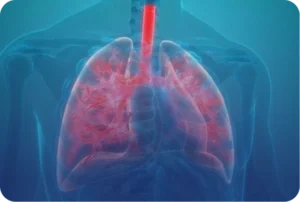
How Breast Cancer Affects Sleep?
It is 3:17 AM. You are staring at the ceiling again, your mind racing between tomorrow’s chemotherapy session for breast cancer and your daughter’s upcoming annual school function. Your body is exhausted from treatment, yet sleep feels impossible. If this sounds familiar, you are not alone.
In my 12 years as a breast oncologist in Nagpur, I have heard this same story from countless brave women: “Doctor sahiba, I used to sleep so peacefully. Now, the moment I close my eyes, my mind starts planning, worrying, calculating. Why has sleep abandoned me when I need it most?”
Your sleepless nights are not a personal failure – they are a documented medical response to the physical and emotional challenges breast cancer brings into your life.

More importantly, there is hope. Sleep disturbances due to breast cancer can be managed effectively, and quality rest can return to your nights.
Today, I want to share with you exactly how breast cancer affects sleep, why this happens, and most crucially – what you can do about it starting tonight.
Sleep disturbances due to breast cancer
A variety of factors can cause sleep disturbances due to breast cancer. Some of them are due to physical reasons, while others arise because of our emotions.
Sleep disturbance is not a sign of weakness – it is a natural response to the challenges breast cancer brings into our lives.
Understanding How Breast Cancer Affects Sleep: The Simple Science
Understanding why breast cancer disrupts your sleep can help you feel more in control and less frustrated with your body.
Physical Reasons Your Body Struggles with Sleep

- Treatment Side Effects: Breast cancer treatment includes chemotherapy medications and steroids. These medications keep your mind alert when it should naturally wind down. Hormonal therapies can cause sudden hot flashes and night sweats - imagine trying to sleep when your body temperature changes dramatically every few hours.
- Pain and Discomfort: Surgical sites may be tender, or you might experience tingling in your hands and feet from certain treatments, which can make finding comfortable positions challenging.
Emotional Reasons Your Mind Stays Active

- Worry and Anxiety: As Indian women, we naturally think about our family's well-being. During quiet nighttime hours, concerns about children's future, household finances, or treatment costs can create what we doctors call "anticipatory anxiety."
- Role Changes: Being accustomed to caring for others and suddenly needing care yourself can be emotionally overwhelming, especially during the vulnerable nighttime hours.
Why Quality Sleep Is Your Treatment Partner
Sleep is not a luxury during breast cancer treatment – it is medicine. Here is why prioritising sleep can significantly improve your treatment outcomes:
- Physical Healing: During deep sleep, your body releases growth hormones that repair damaged tissues and strengthen your immune system. Research shows that women who maintain better sleep patterns respond more effectively to treatment and experience fewer severe side effects.
- Emotional Strength: Quality sleep helps you handle treatment challenges, make important decisions, and maintain positive relationships with loved ones.
Your Sleep Recovery Action Plan
Based on successful outcomes with hundreds of patients, here are proven strategies to reclaim your restful nights:
Quick Environment Changes
- Keep the bedroom slightly cool to manage hot flashes
- Use cotton bedsheets and breathable clothing
- Keep a small handheld fan beside your bed
- Create darkness with curtains or an eye mask
Simple Bedtime Ritual (Start 1 Hour Before Sleep)
- Drink warm milk with turmeric
- Write worries in a notebook (address tomorrow)
- Practice 5-10 minutes of deep breathing
- Avoid mobile phones and television screens
Managing Physical Discomfort
- Take prescribed pain medications as directed - do not feel guilty
- Use extra pillows for support
- Try a gentle foot massage with warm sesame oil for neuropathy
- Have a light dinner 2-3 hours before bedtime
Calming Your Mind
- Recite familiar prayers or mantras
- Practice simple meditation
- Anxiety thoughts are normal, but temporary
When to Seek Additional Support
Please reach out to us if you experience:
- Cannot fall asleep for more than 45 minutes for several nights
- Waking multiple times and unable to return to sleep
- Feeling unrested despite adequate sleep time
- Sleep problems affecting daily activities or treatment
Addressing sleep disturbances due to breast cancer is part of optimising your treatment success.
Your Path to Restful Nights
The sleepless nights you are experiencing are temporary. With proper strategies and medical support, quality sleep will return. Your strength, your family’s love, and modern medical care are all working in your favour.
Ready to Take Action?
If you are in Nagpur or the surrounding areas and sleep difficulties are affecting your treatment journey, I invite you to book a consultation where we can create a personalised sleep management plan as part of your comprehensive care.
Schedule Your Sleep & Cancer Care Consultation:
- Call our clinic at +91 7498336622
- WhatsApp your concerns for a priority appointment
- Visit us for same-day consultation availability
Sweet dreams will return, and when they do, they will be all the more precious for the journey you have travelled to reclaim them.
Every sleepless night brings you one step closer to peaceful rest. You are not just surviving – you are healing.
Latest Blogs


Diet, Lifestyle, and Prevention: Breast Health Tips for Indian Women
Learn how diet, lifestyle changes,


Smoking vs Vaping: 7 Dangerous Myths Killing Your Lungs (Expert Insights)
Yesterday I was passing near


How to do a Self-Breast Examination? (Explained by a Breast Specialist)
Namaste,I’m Dr. Arundhati Marathe Lote,
